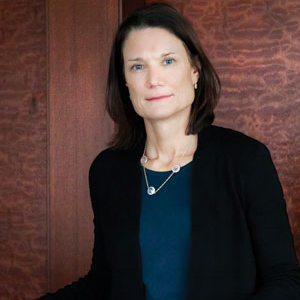Sidley attorneys have provided free services in 25 countries

Diane McEnroe. Photograph by Len Irish.
Sidley’s international effort was inspired by its work on a cotton trade case in Brazil, which prompted the firm to look at other ways it could help the rural poor.
Launched in 2012, the Africa-Asia program offers free legal services to small and midsize agricultural enterprises and nongovernmental organizations focused on development. Since it began, 285 Sidley attorneys have provided counsel to 80 projects in 25 countries, some of them the poorest on Earth.
The program began with a focus on agriculture because the objective was “to assist the bottom of the pyramid in rural parts of Africa and Asia,” explains Scott Andersen, co-managing partner of Sidley’s Geneva office and managing partner of the Africa-Asia program.
Organizations that meet this criteria apply for pro bono services through Sidley’s website. While the administration of the program is funded entirely by Sidley, clients are asked to retain local counsel out of pocket and to cover travel expenses if a Sidley attorney needs to make an in-country visit.
While the program has drifted slightly from its agrarian roots, the goal remains to help those at the bottom of the economic dog pile. The NGOs and enterprises the program helps are as diverse topically as they are geographically.
One client, Rent-to-Own, is a social enterprise in Zambia that provides high-scale equipment to low-scale businesspeople to jump-start economic growth. Another client is Splash Mobile Money in Sierra Leone—the country’s first mobile payment platform to improve peer-to-peer money lending, something particularly helpful for the country’s rural population.
ONE EXAMPLE
Another organization Sidley assists is the Global Shea Alliance, based in Accra, Ghana. The GSA works in 28 countries to promote the use of shea—known as shea butter when used in chocolate and cosmetics.
Sidley advises the GSA on how to dismantle trade barriers in the United States and India. Currently, both countries do not allow shea butter in chocolate. However, as Geneva-based Sidley attorney Colette van der Ven notes, the international standard allows for up to 5 percent of noncocoa vegetable fats in chocolate.
Van der Ven and other Sidley attorneys assist the alliance by providing legal analysis and justification for the rule change. This effort includes the drafting and filing of a citizen petition with the Food and Drug Administration to change the rule, as well as organizing a panel at the World Trade Organization Public Forum about shea butter and regulatory barriers, according to Diane McEnroe, a partner in Sidley’s New York office.
“They are an incredibly passionate group of attorneys,” explains Joseph Funt, the GSA’s managing director. “They are not just interested in removing the trade barriers; they are interested in our sustainability projects and helping the GSA grow internationally.”
Beyond helping the organizations themselves, this program is a way to improve the in-country law firms they partner with. According to Andersen, the partnership between Sidley and a Ghanaian firm improved that firm’s capacity to take on pro bono legal work. This, he says, will position them to take on Western clients as more Western investment enters the country.
While the core goal of the program is to assist organizations abroad, Sidley attorneys are also reaping benefits. Van der Ven, a WTO litigator, says this work creates a perspective she would not otherwise have. “It helps you to better understand what the on-the-ground implications are of different trade provisions.”
Similarly, McEnroe, whose practice area is FDA regulation, says that working on these pro bono projects provides a better understanding of how things get from the farm to a finished product. “We don’t always see that with our packaged-food clients,” she says.
Tommer Yoked, a sixth-year associate in Sidley’s Houston office, says the breadth of experiences from the Africa-Asia program have given him more confidence.
One of Yoked’s pro bono projects allowed him to take his experience structuring deals in the energy sector and apply it to rural farmers in East Africa. Ultimately, this effort helped farmers in Malawi and Tanzania improve the selling price of their product and decrease the cost they pay for seeds.
Even with the added hurdles in the developing world, Yoked says he feels this work is rewarding because “you are seeing the fruits of your labor.” And of his work in Tanzania he says: “It was one of those moments that made me really glad I went to law school.”
This article originally appeared in the February 2016 issue of the ABA Journal with this headline: “Foreign Aid: Sidley attorneys have provided free services in 25 countries.”



